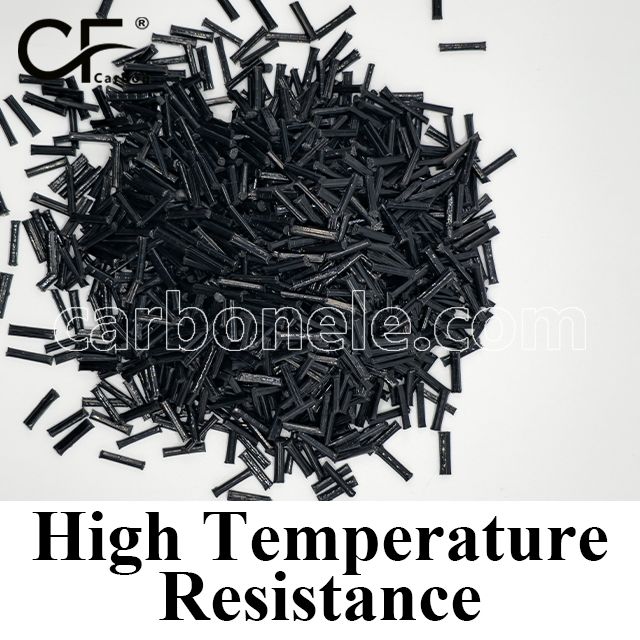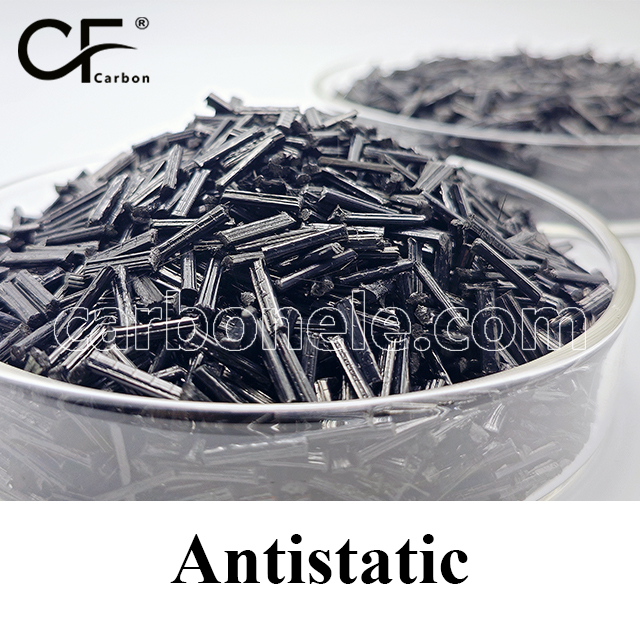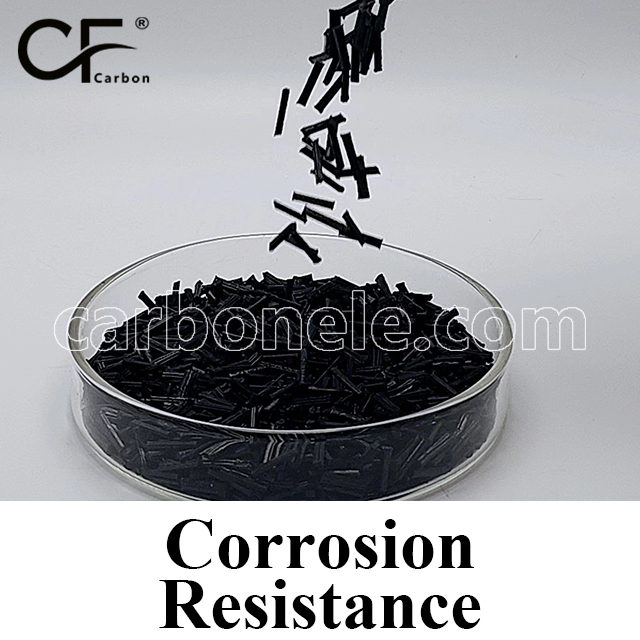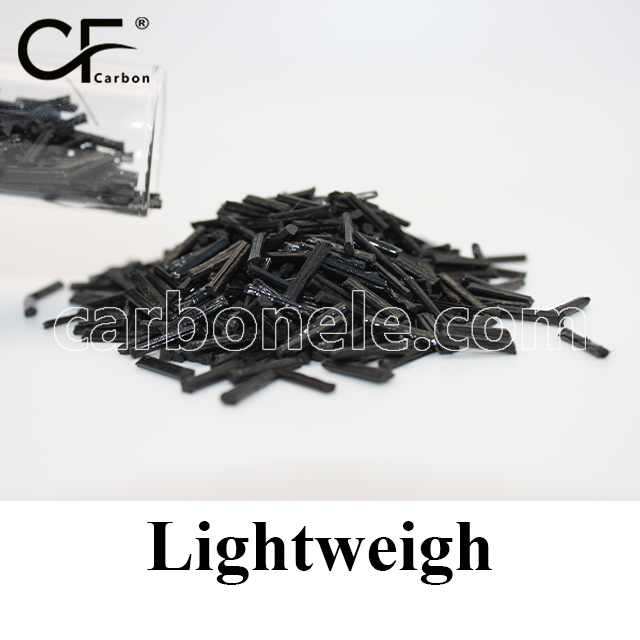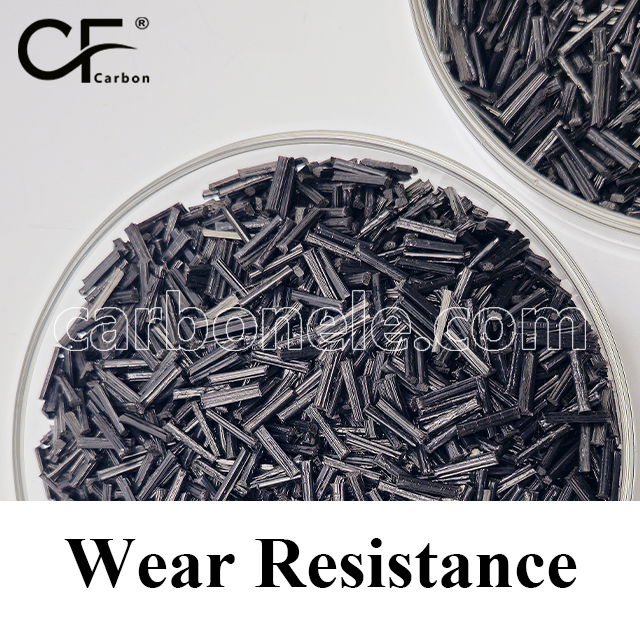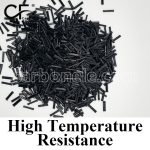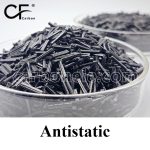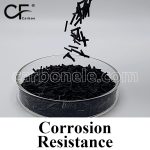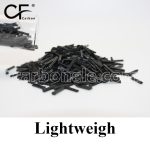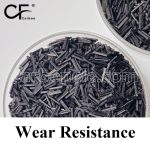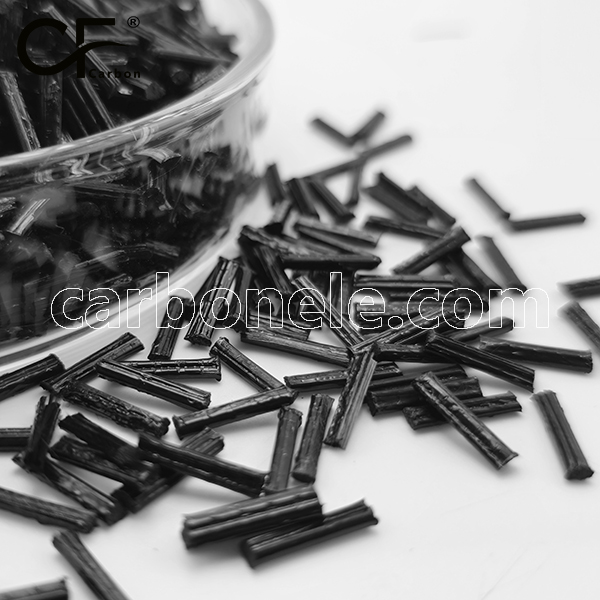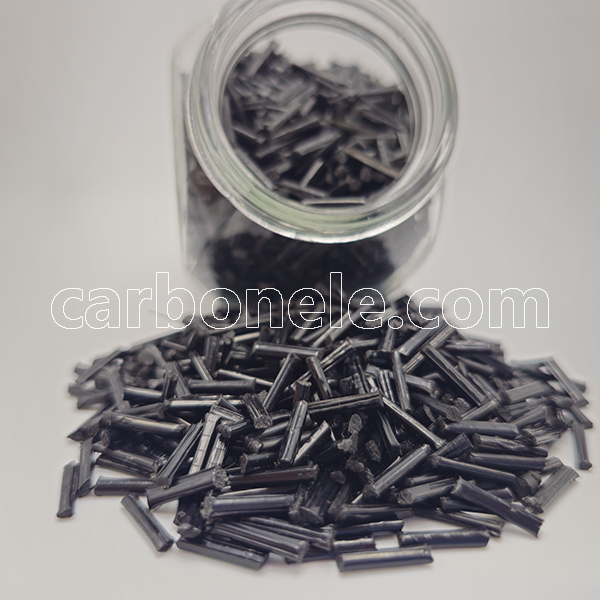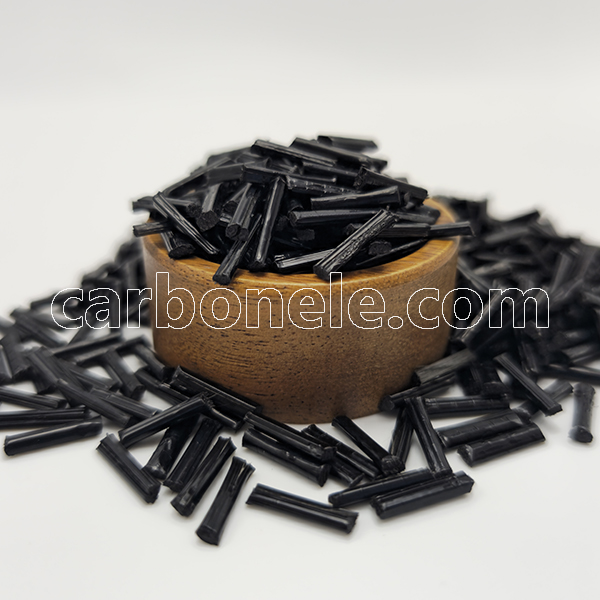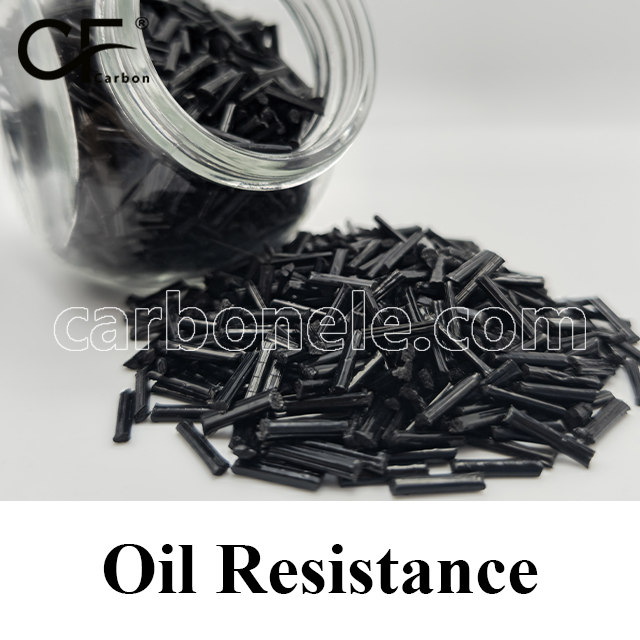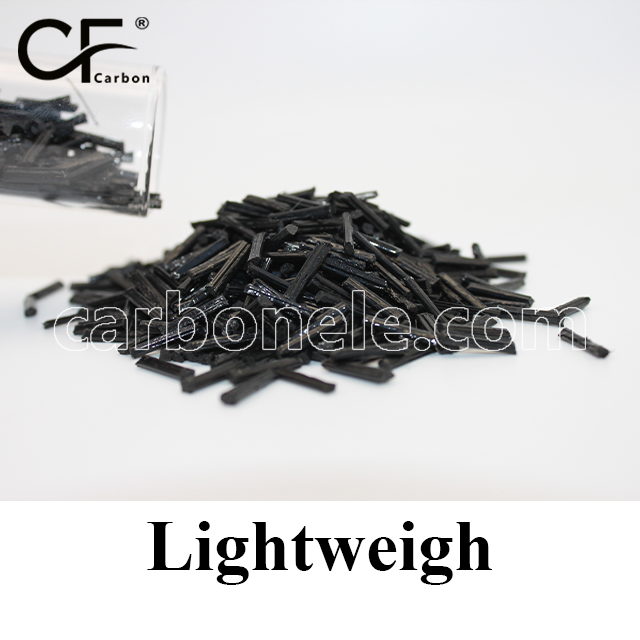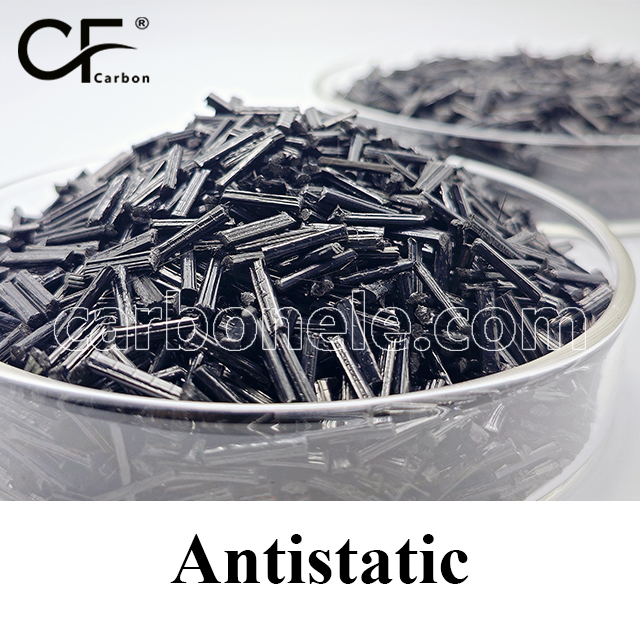PA66-LCF40 is a high-performance polyamide 66 reinforced with 40% long carbon fiber, offering exceptional strength, stiffness, thermal resistance, and dimensional stability. It’s ideal for replacing metal in structural components exposed to high loads, fatigue, or heat—used across automotive, industrial, and high performance engineering applications.

Wear-resistant and self-lubricating PA66-LCF40
- Model number: PA66-LCF-BCA4
- Matrix Resin: Nylon6 6(Polyamide66) (PA66)
- Reinforcing Filler: Carbon fiber
- Appearance: Granules
- Grade: Injection/extrusion grade
- Packaging: 25kgs/bag
PA66-LCF40: Extreme Strength Long Carbon Fiber Reinforced Polyamide 66 for Maximum Structural and Thermal Demands
PA66-LCF40 is an ultra high performance polyamide 66 (PA66) compound reinforced with 40% long carbon fiber (LCF). This premium thermoplastic composite is engineered for the most demanding applications where exceptional mechanical strength, rigidity, dimensional stability, and thermal resistance are critical. With 40% LCF, this material offers near metal performance in many structural uses—while maintaining the lightweight, corrosion resistant, and processable advantages of polymer systems.
The long carbon fiber reinforcement forms a high efficiency load bearing network within the matrix, greatly enhancing fatigue life, minimizing creep and deformation, and ensuring reliable operation under sustained mechanical and thermal stress. PA66-LCF40 is ideal for severe service environments such as high load automotive brackets, industrial machine structures, or precision mechanical elements exposed to extreme conditions.
Key Mechanical Properties
Tensile Strength: ≥ 160 MPa
Flexural Strength: ≥ 210 MPa
Notched Impact Strength: ≥ 13 kJ/m²
With 40% long carbon fiber, PA66-LCF40 delivers unmatched structural performance for a fiber reinforced thermoplastic. Compared to unfilled PA66, it offers well over double the stiffness and tensile strength. The long fibers provide superior load transfer, helping components resist shock, vibration, and fatigue over long operational lifetimes.
Thermal and Chemical Resistance
Heat Deflection Temperature (HDT): Approx. 145°C
Long-Term Service Temperature: Up to 135°C
Chemical Resistance: Excellent resistance to automotive fluids (oils, greases, fuels), weak acids, and alkalis; not suitable for strong oxidizers or concentrated acids
PA66-LCF40 excels in high temperature environments where typical engineering plastics may degrade. It maintains structural integrity under sustained heat exposure, making it an ideal choice for under hood automotive components or industrial equipment in hot zones.
Wear Resistance and Processability
Wear Resistance: Extremely high – supports high load, high friction, and cyclic motion applications
Processing Methods: Injection molding (with LCF capable equipment), compression molding
Processing Notes: Use low shear settings and abrasion resistant tooling to maintain fiber length; ensure uniform dispersion for consistent mechanical properties
The 40% long carbon fiber not only improves wear life but also contributes to outstanding surface durability and low creep under stress. This makes PA66-LCF40 well suited for sliding, rotating, or interfacing parts that undergo constant movement or pressure.
Environmental Stability
Water Absorption: Substantially reduced compared to unreinforced PA66
Dimensional Stability: Excellent—retains tolerances in humid, hot, or changing environments
Thanks to the dense LCF network, PA66-LCF40 resists moisture induced swelling or warping. This is critical in applications where dimensional accuracy and mechanical fit must be maintained over time, especially in outdoor or variable environments.
Typical Applications
PA66-LCF40 is ideal for the most demanding semi structural and structural uses, offering high performance alternatives to aluminum or other metals. Suitable industries and components include:
Automotive:
Engine mounts and chassis reinforcement brackets
Under hood structural components
Hybrid composite metal structural assemblies
Industrial:
Load bearing joints, links, and pivot points in machinery
Fatigue resistant housings and supports
Precision robotic and automation elements
Electronics & Consumer Devices:
Structural enclosures in high heat equipment
Durable internal frames for ruggedized devices
Components under load/vibration where stiffness is key
PA66-LCF40 Performance Summary
| Property | Value/Description |
|---|---|
| Carbon Fiber Content | 40% (Long Carbon Fiber) |
| Tensile Strength | ≥ 160 MPa |
| Flexural Strength | ≥ 210 MPa |
| Notched Impact Strength | ≥ 13 kJ/m² |
| Heat Deflection Temp. | Approx. 145°C |
| Long Term Service Temp. | Up to 135°C |
| Chemical Resistance | Excellent, except strong acids/oxidizers |
| Water Absorption | Lower than unreinforced or short fiber PA66 |
| Processing Methods | Injection molding, compression molding |
| Wear Resistance | Very high – ideal for friction and fatigue |
If you want to get more information about PA66-LCF40, you can vist our Youtube.
Click here to contact us.
Strength between PA66 and PA66-CF
Compared to unreinforced PA66, PA66-CF (carbon fiber reinforced) offers significantly higher strength and stiffness. The addition of carbon fiber increases tensile and flexural strength, enhances dimensional stability, and reduces deformation under load. While standard PA66 provides good toughness and impact resistance, PA66-CF materials are better suited for structural and high-stress applications where superior mechanical performance is required.

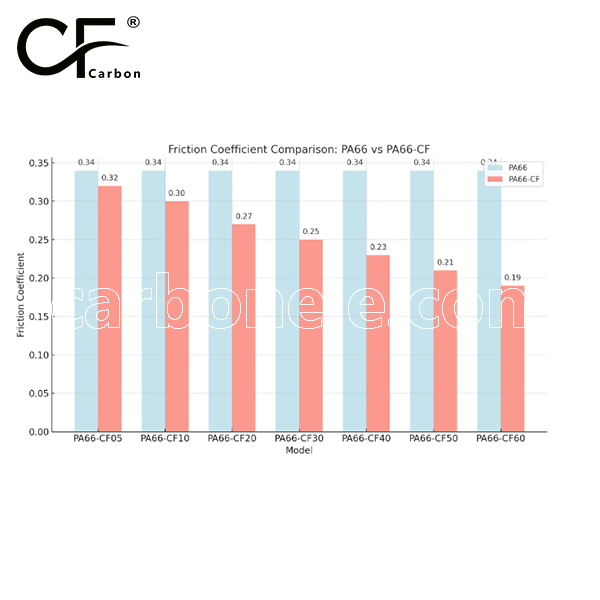

Frequently Asked Questions
Carbon (Xiamen) New Material Co., Ltd. aims to provide buyers with "one-stop" worry-free high-quality services. Here you can find all information about carbon fiber engineering plastics. If you still have questions, please send us an email for consultation!
-
How can I contact the manufacturer of a product that interests me?
When you find a product you are interested in, you can contact the manufacturer directly by sending an email and we will get back to you as soon as possible.
-
How do I find the products that interest me?
All you need to do is enter the keyword, product name in the search window and press the Enter key on your keyboard. Your search results page will then be displayed. You can also search within the product category pages on the home page. Each category is divided into subcategories, allowing you to refine your search and find products that interest you.
-
Where will I find a buying guide?
Please contact our after-sales service directly and we will provide you with a comprehensive operating guide.
-
What are CF Reinforced Thermoplastic Composites?
CF Reinforced Thermoplastic Composites are materials where carbon fibers are incorporated into a thermoplastic matrix. They combine the strength and stiffness of carbon fibers with the processability and recyclability of thermoplastics. For instance, they are used in automotive parts like bumper beams.
-
What are the benefits of CF Reinforced Thermoplastic Composites over traditional composites?
The key benefits include faster production cycles, easier recyclability, and better impact resistance. They also offer design flexibility. An example is in the manufacturing of consumer electronics casings where complex shapes can be achieved more easily.
-
How are CF Reinforced Thermoplastic Composites processed?
Common processing methods include injection molding, extrusion, and compression molding. Injection molding is widely used for mass production. For example, in the production of small components for the medical industry.
-
What industries use CF Reinforced Thermoplastic Composites?
They are utilized in aerospace, automotive, medical, and sports equipment industries. In aerospace, they can be found in interior components. In the medical field, they might be used in prosthetics.
-
How does the carbon fiber content affect the properties of the composites?
Higher carbon fiber content generally leads to increased strength and stiffness but may reduce ductility. A moderate content is often balanced for specific applications. For example, a higher content might be preferred in structural parts of a race car.
-
What are the challenges in using CF Reinforced Thermoplastic Composites?
Challenges include higher material costs, complex processing equipment requirements, and ensuring uniform fiber dispersion. Issues with adhesion between the fibers and the matrix can also arise. An example is in achieving consistent quality in large-scale production.








